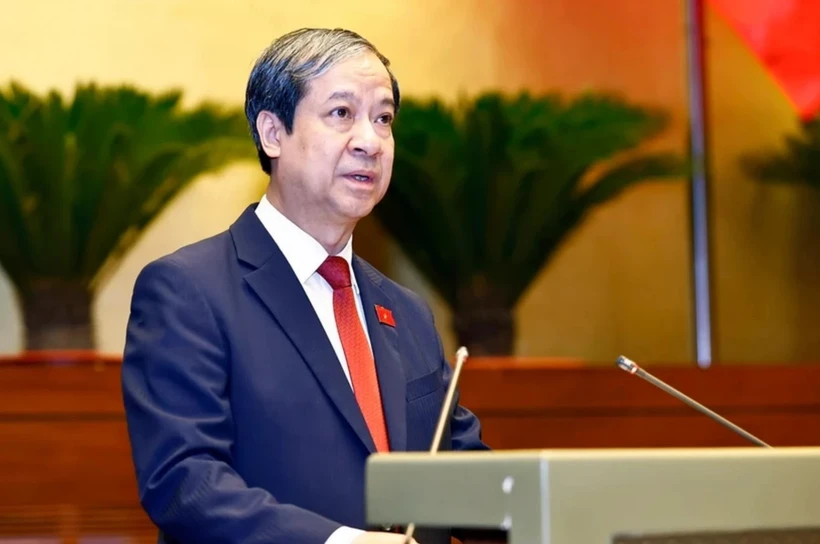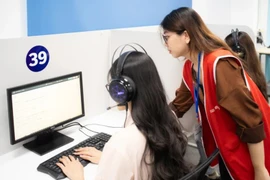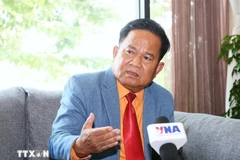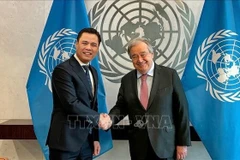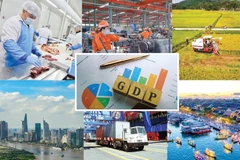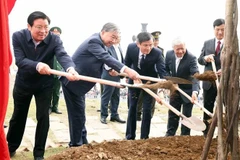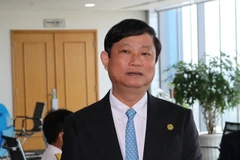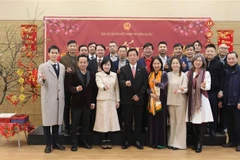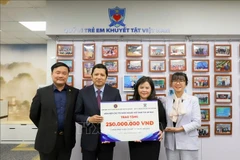Hanoi (VNA) – The year 2024 was transformative for Vietnam's education sector, marked by an intense workload, a multitude of tasks, and groundbreaking achievements that have set the stage for a new development era, Minister of Education and Training Nguyen Kim Son told the press.
- Minister, 2024 was hailed as a year of major milestones for the education sector. Looking back, what are the most notable achievements you would say?
Minister Nguyen Kim Son: The year 2024 marked a decade of comprehensive and fundamental reforms in education and training, in accordance with the 11th Party Central Committee’s Resolution 29. This year was particularly significant with the issuance of the Politburo’s Conclusion No. 91-KL/TW dated August 10, 2024, which outlined the continued implementation of the Resolution No. 29-NQ/TW.
The Politburo’s Conclusion No. 91-KL/TW highlighted that after a decade of realising the Resolution 29, the sector has achieved considerable results. The Conclusion outlined eight key tasks, urging the Party committees, authorities, Vietnam Fatherland Front, and socio-political organisations to continue translating the viewpoints, goals, tasks and solutions outlined in Resolution 29, the 13th National Party Congress’s Resolution, and other Party resolutions on education and training into concrete actions.
Recently, the Ministry of Education and Training (MoET) has been working closely with relevant ministries and agencies to develop an action programme for realising Conclusion No. 91, which has been submitted to the Government for approval.
Beyond these major policy directions, 2024 was also a year of institutional and policy refinement. One of the standout achievements was the presentation and first discussion of the draft Teacher’s Law at the 8th session of the 15th National Assembly (NA).

After nearly two decades of deliberation and over a year of intensive preparation, the sector has achieved a monumental milestone with the drafting of the Teachers' Law. This landmark legislation, crafted with the dedication of experts and officials, has garnered widespread societal support and strong approval from NA deputies during its first presentation. The draft Teacher’s Law, meticulously refined with feedback from deputies, is now scheduled for a second review at the NA’s 9th session. Anticipation is high that the bill will be approved during this session.
The year 2024 also saw the completion of the first cycle of the 2018 General Education Programme across all education levels nationwide. This achievement included the finalisation of approved textbooks from grade 1 to grade 12, ensuring a standardised and quality educational experience for all students. The successful adoption of the socialised model for textbook management has been instrumental in this reform.
Another major milestone was the successful organisation of the high school graduation exam under the 2006 curriculum. This paves the way for the upcoming reform-oriented exams starting in 2025, which will be based on the 2018 General Education Programme. For the first time, these exams will focus on competency rather than mere content and knowledge, aiming to achieve three key goals: graduation evaluation, assessment of teaching and learning processes, and criteria for university and vocational education admissions.
The MoET has already announced the exam plan, structure, and sample questions for the 2025 high school graduation exam.
Alongside these reforms, the MoET has been diligently preparing for changes in high school and university entrance exams. This includes the revision and supplementation of existing regulations to align with the new educational standards.
2024 also witnessed the outstanding performance of Vietnamese students in international and regional Olympic competitions, showcasing the country's educational prowess on a global stage. Additionally, the university entrance exam saw a hike in applicants and enrollments, reflecting a growing interest in higher education. Notably, there has been a surge in the appeal of pedagogy courses and those related to artificial intelligence, particularly in the semiconductor industry.
Early childhood education, a sector traditionally burdened with challenges, saw a turning point driven by more policy attention, investment and strategic direction. Lifelong learning and the development of a learning society have remained top priorities. A standout event was the MoET’s first-ever national conference for directors of continuing education centres. Vietnam now has two more Global Learning Cities recognised by the United Nations Educational, Scientific and Cultural Organisation (UNESCO), bringing the tally nationwide to five.
Throughout 2024, teachers and school facilities earned further support from local authorities and the education sector. Despite ongoing teacher shortages, various localities have taken flexible and decisive solutions to address this challenge. The MoET held a national conference focused on the solidification of school buildings and teacher’s accommodation, setting a goal to achieve 100% solidified schools by 2030.
The year 2024 also saw a strong emphasis on digital transformation within the sector, with major milestones achieved. Education departments across various localities worked tirelessly to overcome challenges posed by natural disasters, ensuring that educational duties were fulfilled despite adversity. The collective effort and unity demonstrated by the sector in the face of these challenges were truly admirable.

- Building on the 2024 successes, the education sector is certainly poised for further progress. Could you share your thoughts on its future prospects?
Minister Nguyen Kim Son: The sector has distinct advantages. First, we have an overwhelming wave of public support, which has amplified our partnerships and joint efforts to tackle the myriad tasks ahead.
I could mention clear guidance and directions from the Party, State, Government and NA, as well as recognition and encouragement from Party and State leaders. Furthermore, there is active collaboration across central and local levels, all working together to support the education cause.
The ongoing improvements in general policies, along with specific policies affecting the education sector, have also facilitated the continuous reforms in education and training.
While challenges regarding the quantity and quality of lecturers persist, it is undeniable that we are at a time when the teaching workforce is not only large in number but also well-trained and possesses strong professional expertise. With roughly 1.6 million dedicated and qualified teachers, who play a crucial role in determining the quality of education, the sector has a major advantage.
Thanks to rapid technological advancements and increasingly extensive global integration, education has benefitted greatly. Both teachers and students are quickly optimising these advantages to innovate, bringing the quality of education closer to global and regional standards.

- Beyond advantages, what are the challenges faced by the education sector in this new era, minister?
Minister Nguyen Kim Son: The education sector is indeed blessed with many advantages, but these opportunities come with their own set of challenges. Firstly, the spotlight on education has intensified, bringing with it high expectations from the public. These expectations, while inspiring, are met with a reality of modest financial investment in the sector. This mismatch between expectation and investment places pressure on us to deliver exceptional outcomes with limited resources.
The support from parents and society, while crucial, is sometimes insufficient or misunderstood. This lack of understanding also potentially hinder our efforts.
Infrastructure and classroom shortages, particularly in remote areas and even in large cities, present another hurdle. Despite local authorities' efforts to invest more, the growth in student numbers and the demands of modern educational standards often outstrip our current capabilities.
Teacher shortage is another stark reality we confront. Keeping our educators motivated and addressing their grievances, such as insufficient income, limited working conditions, and the need to continually adapt to educational reforms, is a task we can't overlook. The quality and retention of our teaching staff are fundamental to educational success.
Lastly, the swift advancement of technology presents us with both a boon and a burden. Integrating new tech into our educational system, ensuring it is used effectively, and providing governance over its application are complex tasks.
- With these advantages and challenges in mind, what are your hopes and messages for the year 2025?
Minister Nguyen Kim Son: As we look toward 2025, it's clear that this year will be pivotal for our education sector. The completion of key tasks and set goals will not only solidify our foundation but also propel us into the next half-decade with vigor. With a multitude of responsibilities ahead, I hope that the entire sector, having already made strides, will continue to strive and accomplish all the targets with unwavering dedication and excellence.
We've seen a decisive shift in 2024 with increased investment and focus on education from both central and local authorities. Many localities have enforced special policies on tuition fees, support for teachers, and investments in infrastructure to boost educational development. My hope is that these effective policies will reach further in 2025 and beyond.
I am also counting on the continued and growing support, understanding, and commitment from the public.
To all the dedicated staff, teachers and employees in our educational system, I wish you health, peace, and happiness. Your tireless work is the backbone of our success. And to our students, I am hopeful for a year filled with joy, progress and exceptional achievements in your academic journey./.
